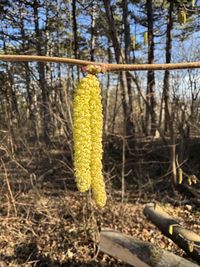Pollen information for Austria from 23 February 2026
High levels of alder and hazel pollen!
Although the abrupt onset of winter at the weekend provided allergy sufferers with some noticeable relief, the weather is expected to become much more spring-like this week, leading to a marked increase in allergy sufferers.
Up to and including Tuesday, the pollen count will be somewhat dampened by occasional precipitation. From Wednesday, however, sunshine and temperatures well above 10 °C can be expected throughout the country. As many early-flowering catkins were already ready to flower before the cold snap, it can be assumed that many plants will start releasing pollen almost simultaneously this week. High levels of pollution are therefore to be expected, especially in lowlands and valleys.
The main culprits here are hazels, which are found both as shrub hazel in sparse forests and on their edges and as tree hazel in many gardens and parks.
Increasingly, pollen from native alder species is also being added, which usually begin to flower somewhat later than hazel. Currently, the grey alder in particular is responsible for the release of pollen. It prefers to grow near bodies of water, for example in riparian forests and along streams and rivers.
Due to the great similarity between the main allergens of hazel and alder, cross-reactions often occur in sensitised individuals. During the forecast period, a high level of exposure is therefore to be expected for anyone who is sensitised to one of these early bloomers.
At higher altitudes, the vegetation period usually starts with a significant time delay, so early bloomers ready to flower and the corresponding exposure can only be expected at very sun-exposed locations during the forecast period.
In addition to the pollen types mentioned above, the following are also represented in the pollen spectrum: Cypress plants. However, they only have a very low potential for allergic exposure.
Flowering alder/hazel | at |
Bregenz | ready to flower |
Eisenstadt | ready to flower |
Graz | ready to flower |
Innsbruck | ready to flower |
Klagenfurt | 2026-02-28 |
Linz | ready to bloom |
Salzburg | ready to flower |
St. Pölten | 2026-02-25 |
Vienna | ready to flower |
Munich | ready to flower |
Bolzano | ready to flower |
Forecast date: 2026-02-23
Note: The data shown here are model data for the expected start of flowering. For more detailed information on the expected pollen count, please refer to the text forecasts.
Responsible for the content
AZ Pollenresearch GmbH
im Auftrag des Vereins Österreichischer Polleninformationsdienst in Kooperation mit der GeoSphere Austria.
Dr. med. Markus Berger, Dr. rer. nat. Johannes M. Bouchal und Lukas Dirr, MSc.
Wetterdaten und Prognosen basierend auf synoptischen Daten:
GeoSphere Austria, Bundesanstalt für Geologie, Geophysik, Klimatologie und Meteorologie (ehemals ZAMG)
zum Team


